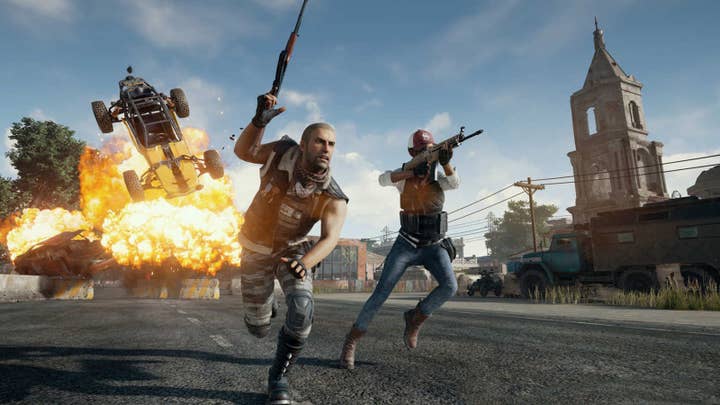PlayerUnknown's Battlegrounds is taking "baby steps" into esports
Creative director Brendan Greene on the unique challenge of turning the Battle Royale genre into a spectator sport
PlayerUnknown's Battlegrounds may be the fastest growing game in the industry, but Bluehole Studio is in no hurry to make it a leading esport. According to creative director Brendan Greene, PUBG's first official esports tournament at this year's Gamescom was the first of many "baby steps" towards what has been an ambition since he first created the Battle Royale genre.
Last weekend, PlayerUnknown's Battlegrounds achieved what only recently seemed like an unrealistic goal: it became the most played game on Steam, usurping Dota 2 after countless weeks at the top of the concurrent users chart. Dota 2 has since reclaimed number one, but the fact that it seems unlikely to hold that position for long is testament to PUBG's remarkable rise.
"This is a first step in trying to find a good format for this, because a Battle Royale esport has never been done before"
Indeed, at this point, only two scenarios seem plausible: the two games switching places on a near daily basis, or PUBG streaking ahead and becoming the new de facto champion of Steam. All of this in less than six months, and with its launch on Xbox due before the end of the year.
What separates PUBG from the other games at the top of the Steam chart is esports. Dota 2 and Counter-Strike: Global Offensive are among the most popular esports, but the first PUBG Invitational only happened last week at Gamescom. Speaking to GamesIndustry.biz at Gamescom's new partner conference Devcom, the game's creator, Brendan Greene, said the lack of official esports activity is not significant of a lack of desire.
"[Esports] is something I've dreamed about for Battle Royale since I started in Arma II," he said, referring to PUBG's origins in his work as a modder. "I've always thought it would be a great spectator sport.
"But this is a first step, y'know; in trying to find a good format for this, number one, because a Battle Royale esport has never been done before. Trying to do a tournament over a few days, where you need six to eight hours of coverage [a day], like, that's hard to do with our game mode. You can't fly in 1,000 players.
"We have to find ways to do this realistically. That's why we're working with ESL and other organisations, to try to figure out what they think. I'm excited about the event, and the whole four days."

PUBG had sold 8 million units on PC alone as of August 21, but its ascent has been so rapid it could well be nearing 9 million by now. That kind of popularity makes it easy to forget not only that it launched in March, but also that it is still in Early Access. According to Greene, Bluehole absolutely intends to position the game as a premier esport, but rushing to take advantage of its current popularity would likely end badly.
"We're not going to be launching fully into esports until we're at least at full launch, and even then we'll want to take it slowly. To build an esport you need amateur players building up to semi-pro. There's a pyramid of players, and that takes time.
"You can't just go, 'We're an esport. It's ready!' The game has to be competitive, it has to be bug free, and it has to work"
"You can't just go, 'We're an esport. It's ready!' The game has to be competitive, it has to be bug free, and it has to work. So many games do go, 'Oh, we're an esport.' But it's like, 'No, you're not. Calm down.'"
Greene described Bluehole's approach as "baby steps," and that is down to the nature of PUBG at least as much as its still unfinished state. The unique, emergent way that PUBG's matches unfold is a huge part of the game's appeal, and it is in stark contrast to the more structured battles that take place in games like League of Legends and Dota 2. When compared to first-person shooter esports, where matches can be over in a few minutes, PUBG seems all the more unusual.
For Greene, though, this apparent incongruence with the most popular esports is exactly what makes PUBG so exciting - and it's road to becoming an established esport so potentially difficult. The esports industry has more or less settled on how to present a MOBA or an FPS to spectators, and there is more common ground between the two than one might assume. For PUBG, presentation will be everything, and Bluehole won't find the solutions by simply looking to other games.
"We allow the player to tell a story," Greene said. "Over the course of 30 minutes you can build a story, and build something you can tell your friends about. With the major first-person shooter esport, Counter-Strike, it's much harder because it's so much faster; sometimes 30 seconds a round. You can get invested in the player because he's amazing, but you can't get invested in his character.
"That's why [PUBG] is good to watch. You can get invested in the character you're seeing, and not just the face in a little square in the corner of the screen."
We are a media partner of Devcom. We attended the event with assistance from the organiser.
